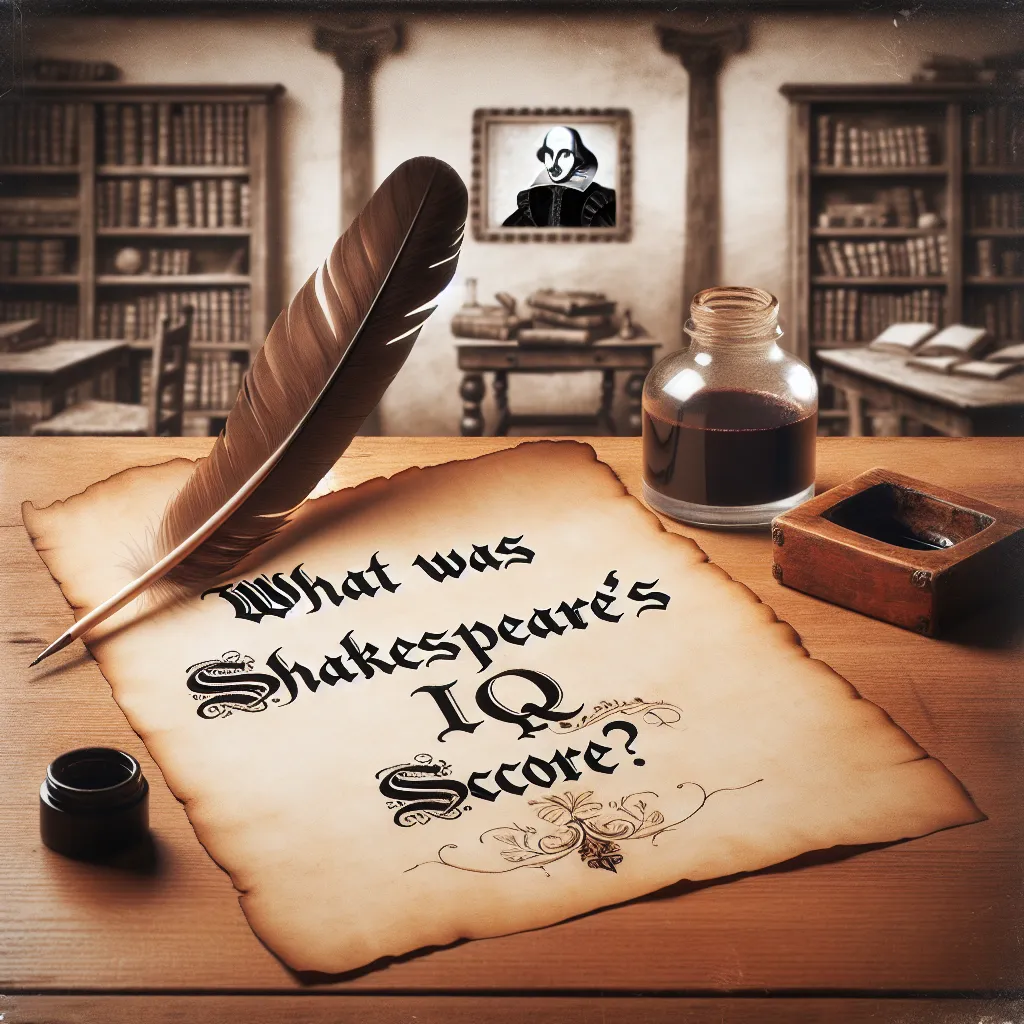What Was Shakespeare’s IQ Score?
If you are a lover of literature or a student of classic plays, you have likely encountered the works of William Shakespeare. Renowned for his impressive command of the English language and his ability to tap into the depths of human experience, Shakespeare’s literary genius has left a mark on the world that few others have replicated. Given the complexity and enduring popularity of his works, a common question arises: What was Shakespeare’s IQ score?
If you are looking for legitimate IQ Tests which pass the entry bar for Mensa, see our [IQ Tests](https://cognitivemetrics.co).
Firstly, it is essential to recognize that quantifying the intelligence of historical figures, particularly those from time periods without standardized intelligence testing, is a notoriously challenging endeavor. The concept of an Intelligence Quotient (IQ) as we understand it today was formulated in the early 20th century, long after Shakespeare had penned his final sonnet. IQ tests, designed to measure cognitive abilities such as reasoning, problem-solving, and understanding complex ideas, simply did not exist in the late 16th and early 17th centuries.
Shakespeare’s Accomplishments and Genius
Despite the absence of formal IQ scores from Shakespeare’s era, his body of work provides ample evidence of an extraordinary intellect. Shakespeare wrote 39 plays, 154 sonnets, and several long-form poems, contributions that have greatly influenced the English language. His plays, including timeless works such as “Hamlet,” “Macbeth,” “Othello,” and “King Lear,” continue to captivate audiences around the world.
His usage of language was both innovative and inventive. He coined numerous words and phrases that have now become integral parts of the English lexicon. Some of the words attributed to him include “assassination,” “bedroom,” “eyeball,” and “fashionable.” Shakespeare’s ability to capture the human condition with vivid metaphors, keen observations, and deep psychological insight is reflective of a mind capable of immense creative and intellectual feats.
Literary scholars and historians have long marveled at Shakespeare’s profound understanding of human nature, his complex characterization, and his masterful manipulation of narrative structure. His plays often explore themes such as love, power, jealousy, betrayal, and ambition, showing a keen awareness of the multifaceted aspects of human experience. This nuanced portrayal of characters and situations implies a high level of cognitive and emotional intelligence.
Estimating an IQ Score for Shakespeare
While we cannot directly measure Shakespeare’s IQ, some scholars and experts have attempted to estimate it based on his work and the impact he has had on literature and culture. Generally, estimates place Shakespeare’s IQ in the range of 150 to 160, which would classify him as having a “genius” level of intelligence. This estimation, though speculative, is based on an analysis of his ability to create complex characters, invent new words, and write with profound insight and versatility.
It is crucial to recognize, however, that such estimates remain speculative. Intelligence is multifaceted, encompassing various domains from logical reasoning to creative thinking, and attributing a single numerical score to a person’s cognitive abilities does not capture the intricacies of their intellect.
Contributions Beyond Literature
Beyond his literary contributions, other aspects of Shakespeare’s life and work provide further hints at his remarkable intellect. Shakespeare lived during the Elizabethan era, a period marked by significant social, cultural, and political changes. The rapid expansion of the English language, the flourishing of the arts, and the exploration of new ideas across various fields defined this era. Navigating and thriving in such a vibrant and complex society would have demanded a flexible and perceptive mind.
Shakespeare’s deep understanding of different human experiences and his ability to depict various social strata, from kings and queens to commoners, reflect his intellectual versatility. His plays often incorporated elements of contemporary politics, history, and culture, indicating not only a breadth of knowledge but also a sophisticated ability to weave these elements into compelling narratives.
Shakespeare’s keen sense of human psychology is another testament to his intellect. His characters often deal with internal conflicts, moral dilemmas, and intricate relationships, presenting a nuanced exploration of the human psyche. This psychological depth is one of the reasons his works remain relevant even today.
Contemporary Views on Intelligence
Modern views on intelligence recognize it as a multi-dimensional construct, encompassing a broad range of cognitive, emotional, and social abilities. Howard Gardner’s theory of multiple intelligences, for example, posits that intelligence is not a single entity but comprises different types, including linguistic, logical-mathematical, musical, spatial, bodily-kinesthetic, interpersonal, and intrapersonal intelligences.
Shakespeare’s contributions suggest he possessed strong linguistic intelligence, evident in his wordplay, metaphors, and linguistic creativity. His interpersonal intelligence, reflected in his deep understanding of characters and human relationships, and his intrapersonal intelligence, indicating a profound self-awareness, also appear to be quite pronounced.
Given his ability to blend various forms of knowledge and understanding seamlessly, it seems likely that Shakespeare’s intellect was multi-dimensional, encompassing several types of intelligence as per Gardner’s theory.
Final Thoughts
Ultimately, the question of Shakespeare’s IQ is an intriguing but speculative one. While we can never know Shakespeare’s exact IQ score, the impact of his works, his linguistic ingenuity, his psychological insight, and his cultural and historical knowledge all point to an individual of extraordinary intellectual ability. His influence on literature, language, and culture is undeniable, and his works continue to be studied, performed, and revered more than four centuries after his death.
In today’s world, the fascination with IQ scores reflects our interest in quantifying and understanding intelligence. However, Shakespeare’s legacy reminds us that true genius transcends numerical limits, manifesting in the depth and breadth of one’s contributions to human knowledge, culture, and understanding.



Leave a Comment